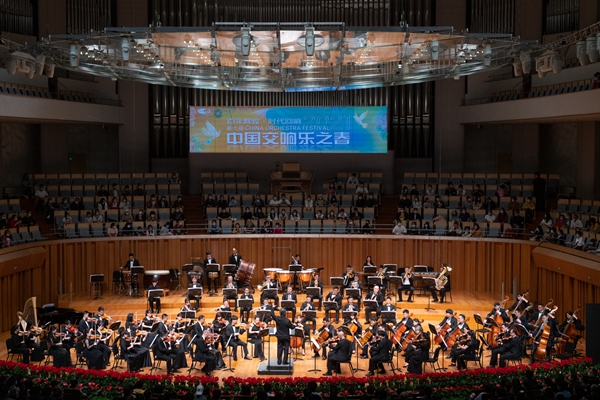

Rehearsals usually take place twice a day from Monday to Thursday. The weekly concert takes place on Friday, with each concert presenting a different repertoire. According to Tang, most of the musicians are in their 30s.
"The average pay range is from 6,000 yuan ($929.7) to 8,000 yuan, which is not a high enough level to attract young musicians. Thus, after recruiting new members, we train them by doing rehearsals and performing. The symphony orchestra is like a school for our new members," Tang says.
Another challenge the orchestra faces is selecting music programs that are "suitable" for local audiences. When Tang joined the symphony orchestra, he was told that local people were not familiar with classical music. He chose some of the most well-known pieces and presented them, in simple terms, before the concerts started. As well as adapting Western classical music, Tang also composes original music pieces that incorporate local folk music. For example, he composed the music piece, Song and Dance on the Hill, in 2015, which portrays the natural scenery of Daliangshan Mountain and borrows elements of local folk songs.
"In the beginning, the local people didn't understand what we wanted to do. With the hundreds of concerts we performed, however, people gradually began to show an interest in classical music,"Tang says.
Tang also teaches piano to local children, who, he says, will benefit from enjoying classical music their whole lives.
But despite the ongoing problems-the lack of resources and the limited funding-the orchestra is constantly growing and gaining recognition. Now, Tang has a wish that the symphony orchestra will one day have a concert hall in the Daliangshan Mountain area. He also wants to create a music school where local children and adults can learn music and how to play instruments.
"This is a passion. I really admire those musicians who have the simple wish to entertain local people with classical music, despite the challenges," says conductor Li Xincao, who works with the China National Symphony Orchestra."I want to perform with the musicians of Sichuan Liangshan Mountain Symphony Orchestra in the Daliangshan Mountain area and invite them to perform with musicians of the China National Symphony Orchestra."
Zhao Yi, a Beijing native, who learned to play the trombone at 8 years old, joined the Sichuan Liangshan Mountain Symphony Orchestra in 2015 after graduating with a major in computer science from the University of Electronic Science and Technology of China in Chengdu, Sichuan province.
"What attracted me to join the symphony orchestra was its conductor, Tang Qingshi, who has the passion to overcome difficulties the orchestra faces," says Zhao."The symphony orchestra has offered me a stage on which to perform, even though I am not academically trained.
"Here in the Daliangshan Mountain area, local people have a saying that they are able to sing from the moment they are born, referring to the local's love of music. They have a natural talent for it,"Zhao says. "While some people describe it (classical music) as Western music, we say it's not-it's an expression of ourselves."